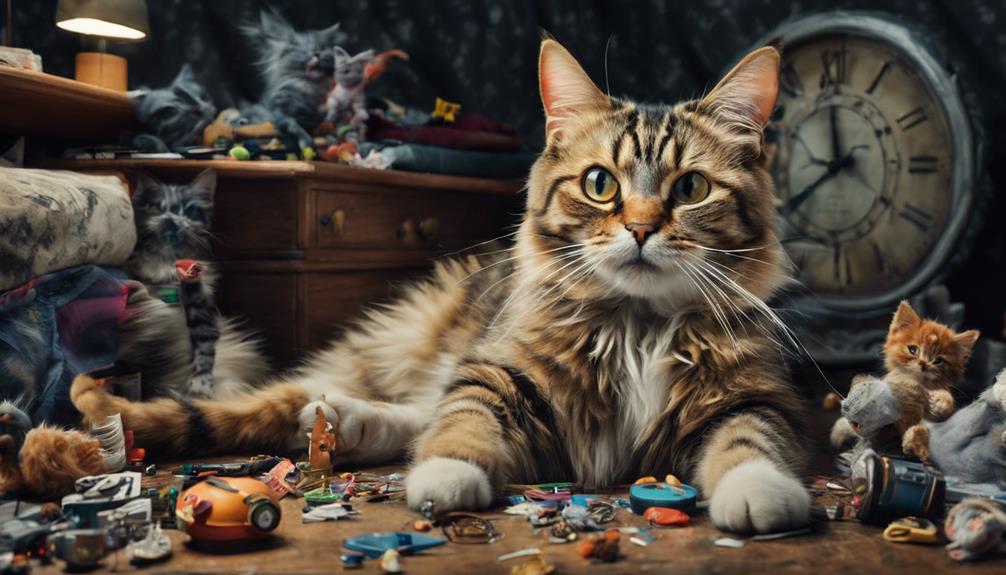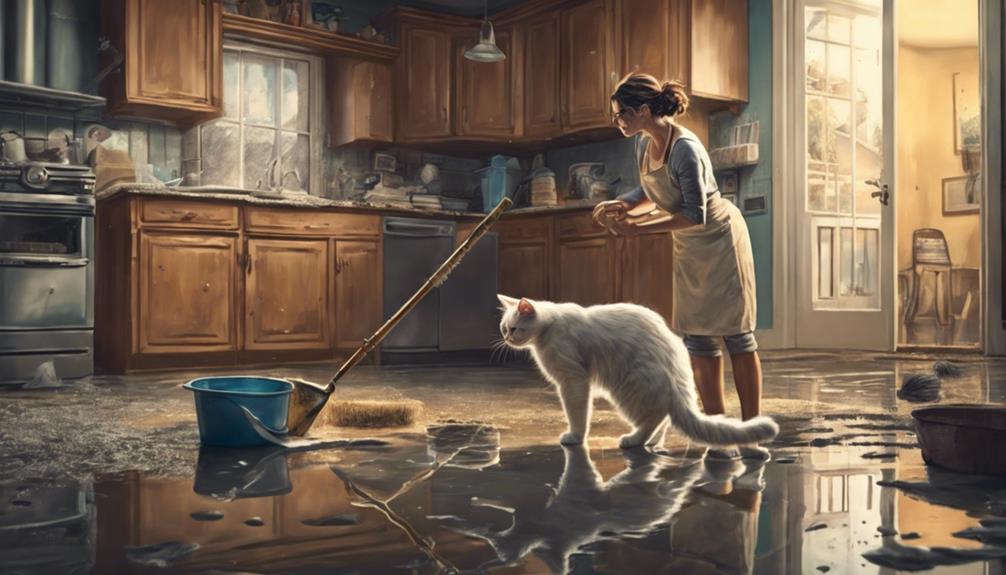If your cat yowls at night, it could be due to their crepuscular nature. Cats are most active during dawn and twilight hours, driven by hunting instincts. Guarantee playtime and proper feeding to curb this behavior. Boredom and health issues like hyperthyroidism may also trigger yowling. Consistent routines and a calming environment can help. To solve this, understand the causes, maintain routines, and consult a vet if needed. Enrichment activities and addressing behavioral issues are vital. By grasping their behavior and taking proactive steps, you can achieve peaceful nights for both you and your feline friend.
Key Takeaways
- Establish consistent feeding, playtime, and bedtime routines for your cat.
- Use nightlights to reduce anxiety and promote relaxation during the night.
- Address underlying health issues by seeking veterinary advice and specialized tests.
- Engage in enrichment activities like interactive toys and puzzle feeders.
- Maintain interactions to reduce stress and anxiety, promoting a secure environment for your cat.
Understanding Cat Behavior at Night
We can gain valuable insights into our feline companions' nighttime behavior by recognizing that cats are naturally most active during dawn and twilight hours. When it comes to night-time meowing, understanding the reasons behind this behavior is critical.
One common cause of night-time yowling in cats is boredom. Cats are intelligent creatures that need mental stimulation and physical activity. If they aren't adequately engaged during the day, they may seek attention or express their restlessness through meowing at night.
To address night-time meowing due to boredom in cats, it's important to make sure they've enough interactive toys, scratching posts, and playtime opportunities during the day. Creating a stimulating environment with hiding spots, climbing structures, and puzzle feeders can help keep your cat entertained and mentally stimulated.
Recognizing Crepuscular Nature
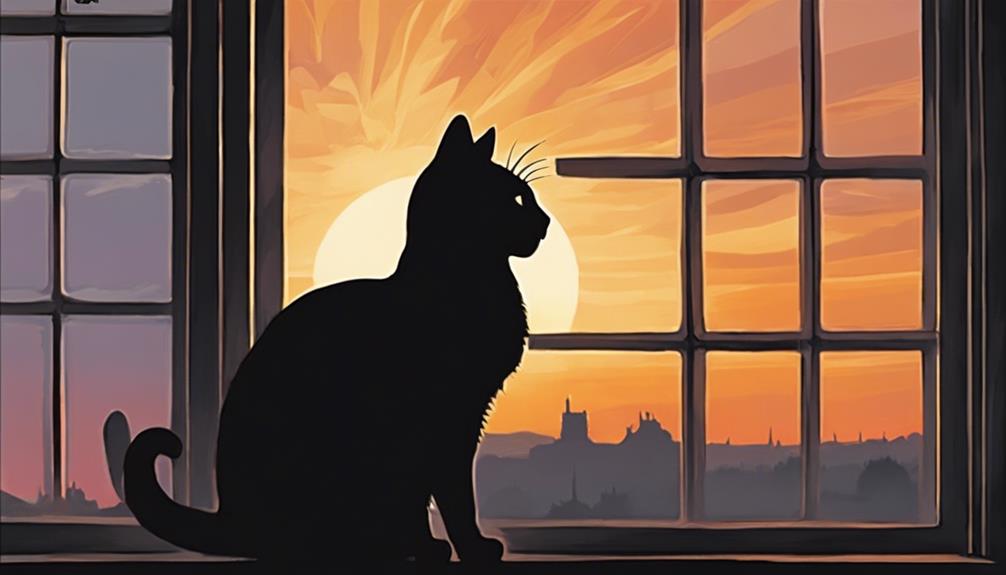
Cats, being crepuscular animals, are most active during dawn and dusk, driven by their natural hunting instincts. This means that when your feline friend is yowling at night, it could be their way of expressing their need for playtime or food. Understanding their crepuscular nature is key to addressing these nighttime behaviors. By acknowledging that cats are wired to be more active during these times, we can better cater to their instincts.
To help reduce nighttime yowling, engaging in playtime before bed can be beneficial. This allows your cat to satisfy their hunting instincts and burn off excess energy, potentially leading to a quieter night for both you and your furry companion. By recognizing and respecting their crepuscular nature, you can create a more harmonious environment for your cat and yourself.
Addressing Health Factors
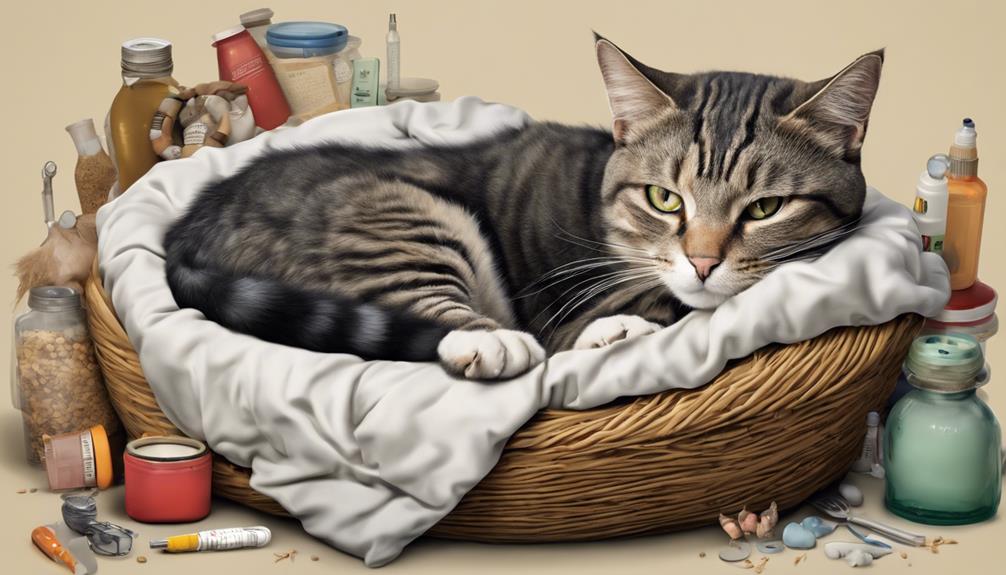
Nighttime yowling in felines can signal underlying health concerns like hyperthyroidism or kidney disease. If your cat is vocalizing excessively at night, it could be a sign of pain or discomfort that needs veterinary attention.
Arthritis, a common issue in older cats, may cause nighttime yowling due to pain and mobility issues. Hyperthyroidism, a condition where the thyroid gland is overactive, can lead to confusion and increased appetite, potentially causing disruptive behavior at night.
Kidney problems, such as kidney disease, may also manifest as nighttime yowling, accompanied by increased thirst and weight loss. Addressing these health issues promptly is vital to improve your cat's quality of life and safeguard their well-being.
If you notice your feline companion yowling at night, especially if it's a new behavior, consulting with a veterinarian to rule out any underlying health problems is important.
Dealing With Behavioral Triggers
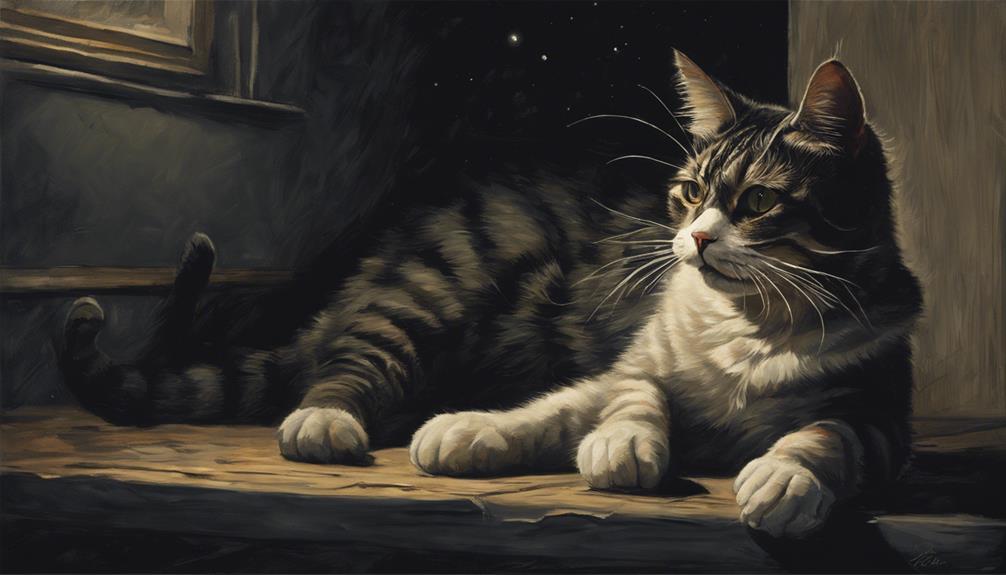
Identifying environmental stressors that trigger nighttime yowling in cats is essential for addressing behavioral triggers effectively. Cats can exhibit behavioral problems due to various environmental stressors, such as separation anxiety. Understanding these triggers is vital in providing a safe and enriched environment to reduce nighttime yowling. To help you navigate through these triggers, we have compiled a table below outlining common behavioral triggers and ways to manage them:
| Behavioral Triggers | Management Strategies |
|---|---|
| Separation Anxiety | Establish a consistent routine, provide interactive toys, and consider a companion for your cat. |
| Territorial Behavior | Implement calming pheromones, create vertical spaces, and offer scratching posts. |
| Cognitive Dysfunction | Provide mental stimulation, consider puzzle feeders, and consult with your veterinarian for specific interventions. |
| Environmental Stressors | Ensure a quiet sleeping area, maintain a regular feeding schedule, and offer hiding spots for your cat. |
Impact of Boredom on Cats
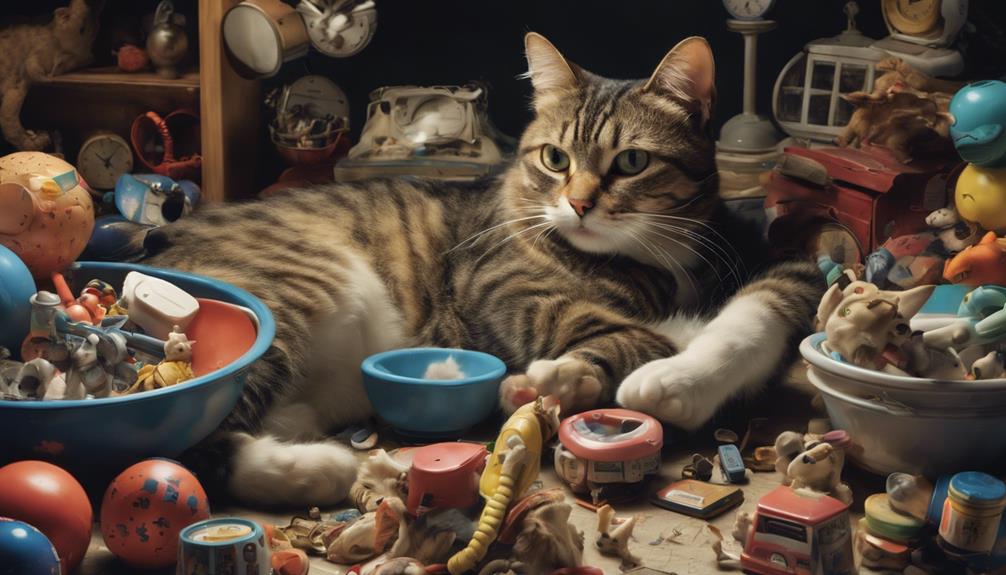
To understand the impact of boredom on cats, we must recognize the important role mental and physical stimulation play in their well-being. Cats are natural hunters, and without adequate stimulation, they can become restless, leading to disruptive nighttime behaviors. When cats lack daytime activities to engage their minds and bodies, boredom sets in, causing them to seek attention during the night. This boredom often manifests as increased yowling and other attention-seeking behaviors when we're trying to rest.
It's essential to address boredom in cats to prevent nighttime disturbances. Providing mental enrichment activities can help fulfill their predatory instincts and keep them mentally engaged. By offering interactive toys, puzzle feeders, or scheduled playtime, we can help alleviate their boredom and reduce disruptive behaviors at night. Understanding the impact of boredom on cats is the first step towards creating a harmonious environment for both feline and human companions.
Strategies for Mental Stimulation
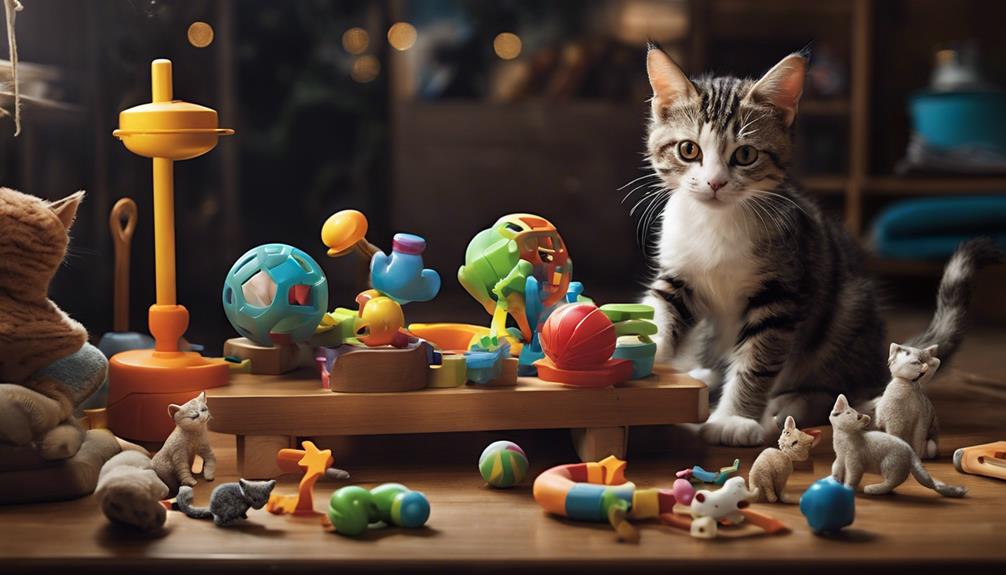
Engage your cat in stimulating play sessions using toys that mimic hunting behaviors to provide essential mental stimulation. Interactive play sessions are vital for keeping your cat's mind sharp and preventing cognitive dysfunction. By rotating your cat's toys regularly, you can make sure they stay engaged and avoid boredom.
Additionally, offering puzzle feeders or food dispensing toys encourages problem-solving skills and mental activity, stimulating their mind in a fun way.
Creating a stimulating indoor environment is also important. Cat trees, scratching posts, and hiding spots offer opportunities for exploration and mental engagement. Introducing new activities or training sessions can challenge your cat's cognitive abilities, preventing nighttime yowling out of sheer boredom.
Strategies for Physical Stimulation
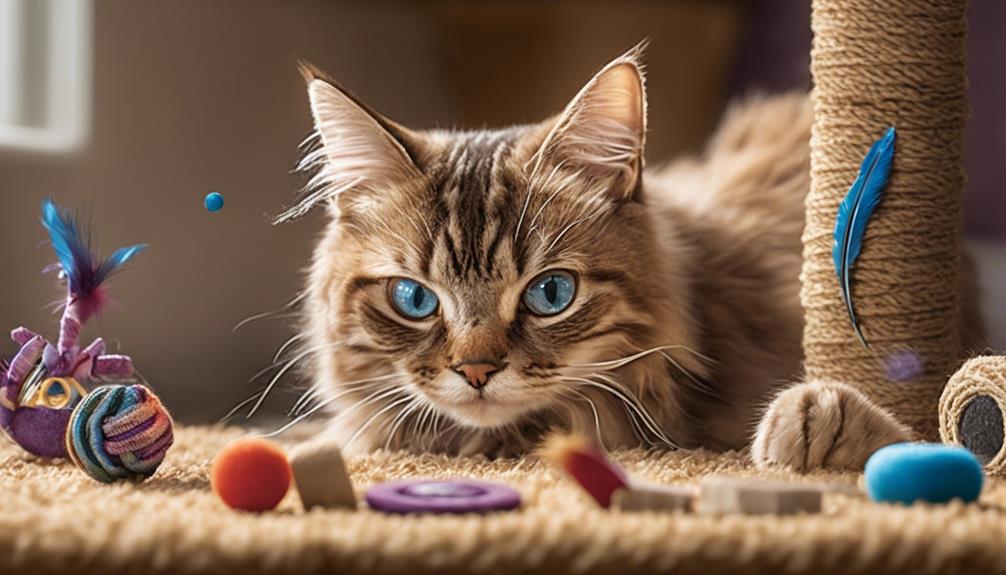
Regularly incorporating interactive play sessions using a variety of stimulating toys is essential for providing physical stimulation to your cat. Engage your furry friend with toys like wand toys, laser pointers, and catnip-filled toys to keep them active and entertained. Creating a cat-friendly environment with vertical spaces such as cat trees, shelves, and window perches encourages climbing and jumping, promoting physical exercise. Utilizing puzzle feeders or food-dispensing toys adds an element of fun to mealtime, stimulating your cat's hunting instincts. Remember to rotate and introduce new toys regularly to prevent boredom and maintain your cat's interest. For an extra challenge, consider setting up DIY obstacle courses or agility training stations to test your cat's physical abilities and provide mental stimulation simultaneously.
| Cat Toys | Benefits |
|---|---|
| Wand Toys | Encourage active play and bonding time |
| Laser Pointers | Stimulate chasing and pouncing behaviors |
| Catnip-Filled Toys | Provide sensory enrichment and excitement |
| Puzzle Feeders | Engage your cat's problem-solving skills |
| Food-Dispensing Toys | Promote physical activity while eating |
Consistent Responses to Cat Yowling
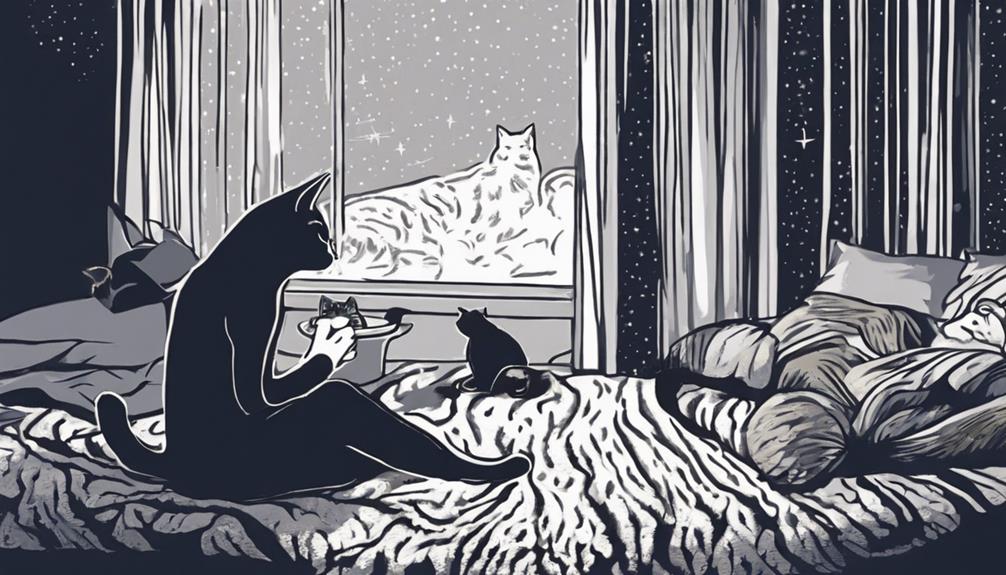
Shifting from techniques for physical stimulation to tackling cat yowling behavior, consistent responses play an essential role in modifying this unwanted behavior. When our feline friends start yowling, it can be tempting to respond immediately. However, by consistently not rewarding this behavior with attention, we send a clear message to our cats.
Ignoring the yowling communicates to them that they won't get a response through this behavior. Inconsistency in our responses can confuse our cats and inadvertently reinforce the yowling. By establishing a routine of no response to yowling, we set the stage for behavior modification.
Establishing Nighttime Routines

Establishing a consistent nighttime routine is crucial for helping your cat adjust their internal clock and promoting restful sleep. Here are three key steps to contemplate:
- Engage in Interactive Play Sessions: Before bedtime, indulge your feline friend in interactive play sessions. This not only satisfies their hunting instincts but also helps tire them out, making it easier for them to settle down for the night.
- Avoid Feeding Right Before Bed: To prevent your cat from associating nighttime with mealtime, it's best to refrain from feeding them immediately before bedtime. This can help reduce disruptive behavior during the night.
- Create a Calming Environment: Make sure your cat has a comfortable sleeping area, with essential resources like water and litter easily accessible. By providing a calming environment, you can help your cat feel secure and relaxed, promoting better sleep quality.
Avoiding Reinforcement of Yowling

To prevent reinforcing your cat's yowling behavior at night, refrain from responding to their vocalizations. This can inadvertently encourage the unwanted behavior to persist. It might be challenging, but it's essential not to give in to their demands for attention or food when they yowl. By doing so, you avoid rewarding the behavior and help break the cycle of reinforcement that keeps it going.
Cats are likely to yowl at night due to common reasons such as seeking attention, feeling anxious, or being in heat. For senior cats, yowling can also be a sign of cognitive dysfunction or medical issues. Understanding the underlying cause can help address the behavior more effectively.
Preventing Nighttime Disruptions
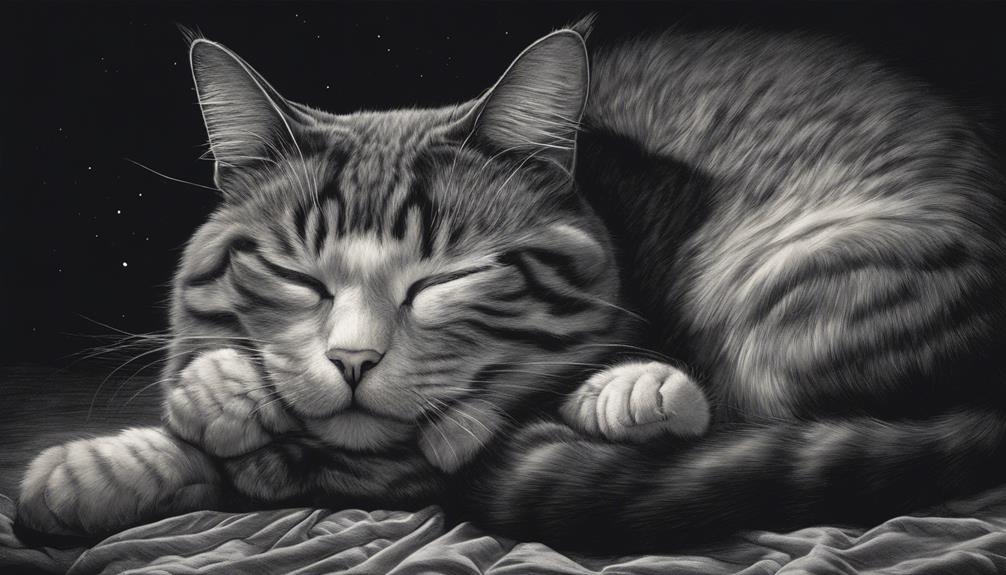
Engaging in playtime before bedtime satisfies your cat's hunting instincts and helps reduce nighttime yowling. Interactive play sessions not only tire out your feline friend but also provide mental stimulation, making them less likely to meow excessively at night.
Here are three key tips to prevent nighttime disruptions:
- Scheduled Playtime: Establish a routine of interactive play sessions during the day to keep your cat entertained and engaged. This will help exhaust their energy, making them more likely to rest peacefully at night.
- Feeding Schedule: Guarantee your cat's food and water needs are fulfilled before bedtime to prevent them from meowing for attention during the night. A satisfied belly can contribute to a quieter evening for both you and your furry companion.
- Ignore Nighttime Meows: While it may be challenging, disregarding your cat's vocalizations at night can help discourage attention-seeking behavior. By not reinforcing their meows with attention, you can help reduce excessive nighttime disruptions.
Creating a Conducive Environment

Placing nightlights strategically around the home can create a sense of security for your cat and help alleviate nighttime anxiety. Cats are creatures of habit and can get easily startled in the dark. By providing gentle illumination, you can make your cat feel safe and secure, reducing the likelihood of nighttime meowing and ensuring a happy feline companion.
To further enhance your cat's environment, consider the following table:
| Tips for Creating a Conducive Environment |
|---|
| 1. Position nightlights strategically around the house. |
| 2. Guarantee the environment is safe and free from hazards. |
| 3. Establish a calm and quiet sleeping area. |
Curbing Cats Nighttime Behavior
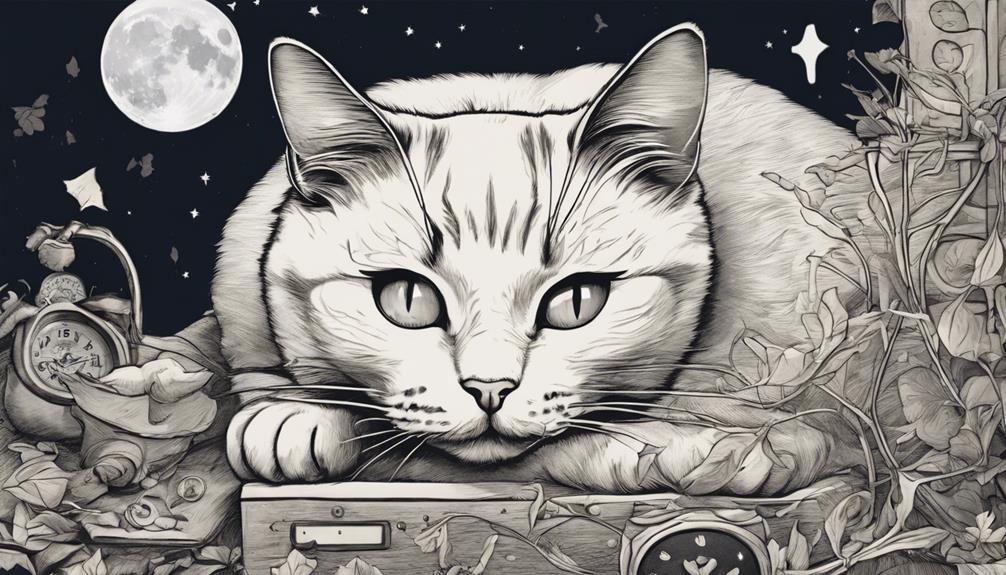
Positioning nightlights strategically around the house not only creates a sense of security but also helps in curbing cats' nighttime behavior, including excessive yowling.
When it comes to curbing your cat's nighttime behavior, there are a few key strategies you can implement:
- Ensuring a Comfortable Environment: Make sure your cat's litter box is clean and easily accessible. Cats may yowl at night if they've trouble reaching their litter box or if it's dirty.
- Interactive Playtime: Engage in interactive play sessions with your cat during the evening to help them release excess energy, reducing the likelihood of nighttime yowling.
- Addressing Attention Needs: Spend quality time with your cat before bedtime to provide them with the attention they crave. This can help alleviate any feelings of loneliness or boredom that may lead to nighttime yowling.
Effective Cat Yowling Solutions
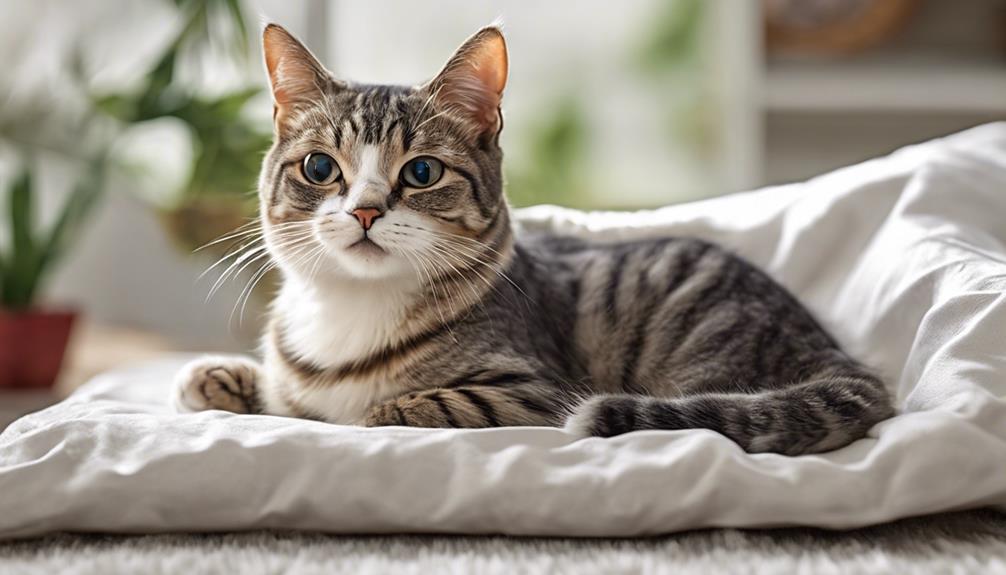
When dealing with a cat's nighttime yowling, it's important to understand the triggers behind this behavior.
Establishing consistent sleep routines for your feline friend can also help reduce excessive vocalization at night.
If the yowling persists despite your efforts, seeking advice from a veterinarian is advisable to rule out any underlying health issues.
Nighttime Yowling Triggers
Understanding the triggers behind a cat's nighttime yowling is pivotal for implementing effective solutions to address this behavior. Here are key factors contributing to nighttime yowling:
- Instinctual Behavior: Cats are crepuscular creatures by nature, meaning they're most active during dawn and dusk, which can lead to increased vocalization at night.
- Overstimulation: Too much excitement or play before bedtime can result in heightened vocalization during the night as cats try to release their excess energy.
- Boredom and Lack of Stimulation: Cats that lack mental or physical stimulation during the day may become restless at night, resorting to yowling for attention or entertainment.
Establishing Sleep Routines
To establish effective sleep routines for your cat and reduce nighttime yowling, consistency in bedtime habits is crucial. Set up a calming bedtime routine that signals to your feline friend it's time to wind down. Engage in interactive play sessions before bedtime to help expend their energy and encourage a restful night.
Avoid reinforcing nighttime yowling by not responding to it, as this can inadvertently encourage the behavior to continue. Make sure your cat has a comfortable sleeping environment with cozy bedding and a quiet, dark space for uninterrupted rest.
Consider using calming pheromones or soothing music to help create a tranquil atmosphere that promotes relaxation and minimizes nighttime yowling. By establishing a consistent bedtime routine, you can help your cat develop healthier sleep habits and reduce disruptive yowling at night.
Seeking Veterinary Advice
If your cat's nighttime yowling persists despite your efforts to address it, seeking veterinary advice is essential for identifying and addressing any underlying health issues. Here's why consulting a vet is vital:
- Professional Diagnosis: Vets can pinpoint underlying health issues causing the yowling, such as hyperthyroidism or kidney problems.
- Specialized Tests: Blood tests and x-rays may be needed to accurately diagnose conditions related to nighttime yowling.
- Tailored Treatment: Vets offer personalized solutions and treatment plans to manage and reduce your cat's nighttime yowling effectively.
Don't hesitate to reach out to your vet for guidance. They can provide the necessary expertise to safeguard your cat's well-being and peaceful nights for both of you.
Promoting Peaceful Nights
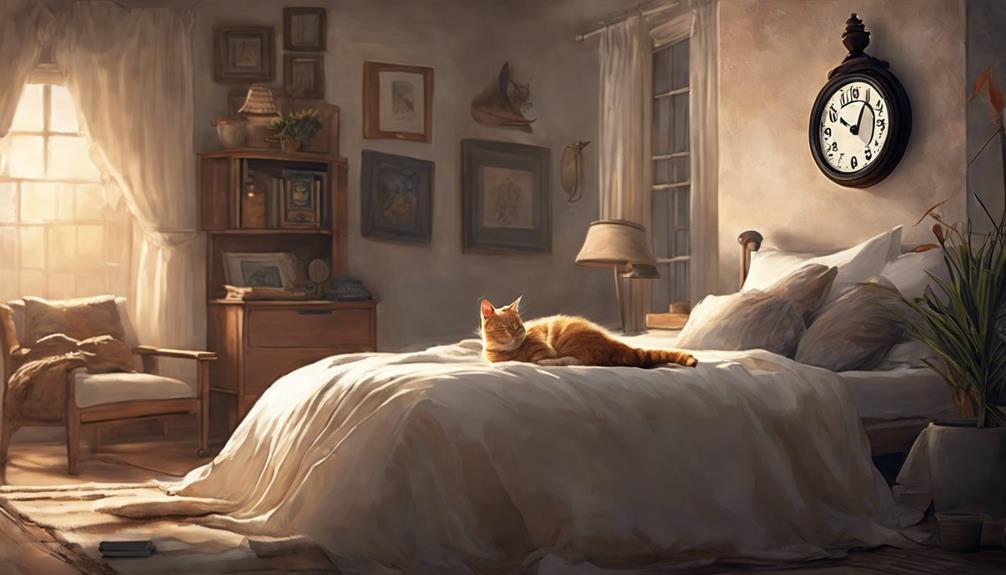
For promoting peaceful nights with your yowling cat, establishing a calming bedtime routine is key. This routine can help satisfy your cat's hunting instincts before sleep, reducing the urge to yowl at night.
Providing interactive toys or puzzles during the day keeps your cat mentally stimulated, potentially preventing excessive nighttime activity. Additionally, using calming pheromones or CBD treats can help reduce overstimulation and decrease nighttime yowling episodes.
Creating a safe and comfortable environment with nightlights can also ease anxiety and promote relaxation, aiding in preventing disruptive behavior at night. Consistency in addressing territorial behavior and providing enrichment activities can further help reduce nighttime yowling related to mating instincts.
Frequently Asked Questions
How Do You Train a Cat to Stop Yowling?
We focus on positively reinforcing quiet behavior with treats and engaging toys, establishing a consistent bedtime routine, and considering calming aids. Consulting with a vet is important to rule out medical causes. Let's work together on this!
How Do I Get My Cat to Shut up in Heat?
We calm restless nights with soothing words. We ease yowling woes with love and care. Our feline friend's cries fade as we embrace solutions. Together, we find peace in the silence of the night.
How Do I Get My Cat to Stop Bothering Me at Night?
We make sure to engage in playtime before bed, provide a stable environment with stimulating activities, use calming pheromones, and establish a routine of feeding, playtime, and comforting interactions to help our cat adjust to a peaceful nighttime schedule.
Why Won't My Cat Stop Yowling?
We've observed our cat's continuous yowling at night may be attributed to innate instincts, monotony, tension, or health problems. Overlooking the fundamental reason can extend disturbances. Making behavioral and environmental adaptations is crucial to aid our feline companion.
How Can I Stop My Cat From Yowling at Night?
If you want to stop your cat from yowling at night, managing your cat’s growth is a crucial step. Ensure they have enough playtime and mental stimulation during the day, feed them a hearty meal before bedtime, and create a peaceful sleeping environment. Consulting with a veterinarian can also provide helpful insights.
Conclusion
To sum up, understanding and addressing your cat's nighttime yowling behavior is essential for promoting peaceful nights for both you and your feline friend.
By recognizing their natural instincts, addressing health issues, managing behavioral triggers, and providing a stimulating environment, you can effectively curb their nighttime antics.
With patience and persistence, you can create a harmonious living space where both you and your cat can enjoy restful sleep.
